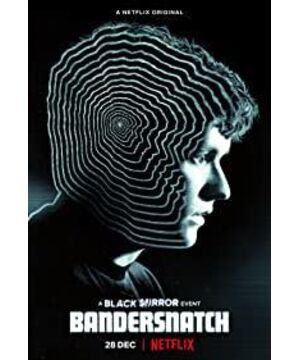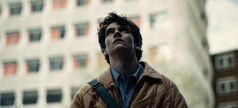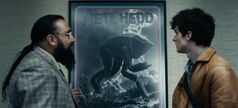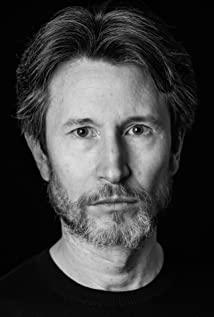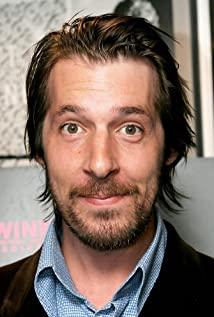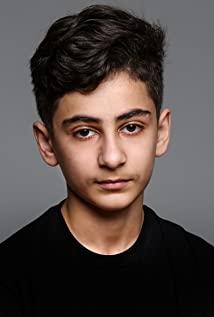Before the text begins, let me say two digressions.
In fan circle lingo, it's a heart-wrenching thing that idols don't "operate". So speaking of this, the boy I like Fionn Whitehead (the male protagonist of this film) is such a person who doesn't "operate" very often (he doesn't have a social network account, and I want to see what he looks like now, relying solely on his works and him on other people's social networks). However, when I learned that the rare "business" he was going to appear in this season of «Black Mirror», my heart not only fluctuated violently, but I even didn't know how to laugh. After all, after the fourth season of Black Mirror, different people have different standards: you can say that it is not satisfactory, but there are still many people who are downhill (or not as amazing as the first two seasons) compared to the first two seasons. Consensus after viewing.
So when I finished the large-scale multiple-choice question of this film last night, I was still immersed in the confusion at the end and couldn't extricate myself (this is for a later story, if it is not listed), the director David Slade popped up on the small TV. name.
Me: "Oh my god isn't that my old buddy!"
So, who is David Slade? He was the director of the fifth episode of «Black Mirror» last season, «Metal Head» (the episode of the robot dog killing people), which was scolded and scolded. Last year, I wrote a drama review for that episode. Everyone in the district said: "This episode is so bad that it doesn't deserve the title of Black Mirror!". So when my old friend's rating has dropped to 8 so far this season, my heart is really not fluctuating, and I even want to laugh a little.
Pull away, start the text.
(Due to my poor software facilities, my netflix does not have Chinese subtitles, so there are inevitably omissions and incomprehension in the raw meat that I ate during the whole process. I hope you can correct me. And is the same as a year ago, I still make a bold statement first. : Just my personal opinion! Friendly exchanges are welcome, if you don't accept it, tear it up! )
First of all, I have to say that if you cannot participate in the interactive experience of this episode, the viewing experience will definitely be discounted, because after all, it seems that the choice of "you" will directly affect the subsequent series of events, thus lead to different outcomes. (In the case of not watching online, you have to see how the resourceful resource groups think about it).
But if it is only done as a formal choice game, the content that this small side story wants to express and adopt is by no means the same.
In the process of watching the plot (playing the game), we may feel novel about this mode of choice at first, and then through the plot, we will gradually perceive the choice of Stefen, the male protagonist in the "manipulation" play, we A connection is established with the protagonist across the screen, in other words, we monitor Stefen's every move. Although this play is a multi-ending series (game), no matter which ending, we can actually find that Stefen has already felt that he is being monitored, so at a certain node, he seems to be questioning us off-screen loudly: " who are you?" "I know that you are watching me". We "control" Stefen's choices, and Stefen is suspicious and vaguely resisting while following our choices. In the present situation, we seem to be the monitors; at the same time, we are also the manipulators, and we choose which cue to give to Stefen based on "self-awareness", thereby leading him to different possible endings.
In previous seasons of Black Mirror, most of them have been describing the impact that current or future technology may have on the present, the future, and possibly the past (S3E4 San Junipero is partly set in the 1980s, but also derived from future technology). But this one happened in 1984, a point in the past.
As a point in time that viewers are explicitly told on the show, 1984 sounds kind of interesting. It's a number many people are familiar with, mostly from George Orwell's novel «1984», which has been read over decades, deconstructed, and the descriptions in the book correspond to the past, the present, or a certain specific historical time period. The protagonist of the book, Winston, is a person and a kind of microcosm. In the world of 1984, he was monitored and he had "resisted". His life contained many images of characters under the JiQuan government. Many symbols in «1984», not to mention "Big Brother", such as telescreen ("telescreen"), DoubleThink ("double thought"), etc., were also used in subsequent works. The content conveyed in the book is not a single idea or theme, and a series of thoughts derived from «1984» have influenced every aspect of many subsequent works.
Speaking of the "telescreen," the book says: "This telescreen can simultaneously receive and transmit any sound Winston makes, as long as it is a little higher than a whisper, and it can be recognized. Not only that, as long as Winston is in the metal Within the sight of the iron plate, not only his voice can be heard, but his appearance can also be seen. Of course, at a certain moment, whether your words and deeds are being monitored. "
Therefore, in 1984, the programmer Xiao Shi, through the electronic equipment in our hands, was also tragically monitored by a "telescreen", leading to different tragic endings. Poor Stefen, like a projection that completely depends on our choices in the face of choices, we monitor every move.
Of course, this is "surveillance" at the most superficial level, the "1984" world at the most superficial level.
(This section involves specific storyline spoilers)
The biggest gimmick of this show is the "interactive experience", but the purpose of the "interactive experience" is just to pack old wine in new bottles. Let's experience this kind of technology that has been used by other film and television dramas before? What we should really experience and feel from this "interactive experience" is to enjoy the pleasure of "choice" and "domination"?
Before answering this question, it is better to ask ourselves: In this "game", are we really making choices according to our own will? As we "manipulate" Stefen's life through the "telescreen", is the "telescreen" also staring at us?
In other words, are we really that watcher?
Before we make the first choice, we all know that our choices will lead to different endings, but here, we need to discuss not the "butterfly effect". Those of us who have exhausted our efforts to find all possible outcomes and list the process tables are somewhat similar to Stefen who has a book and a list in the film.
(If you choose to keep up with Colin, who you meet by chance, when you see a psychiatrist), then when Stefen and his idol programmer Colin are flying leaves at home, Stefen begins to have hallucinations, and Colin seems to open God's perspective and do reading comprehension A sentence that is the same as the key point: "When you make a decision, you think that you are making a choice, but you don't know that it is those souls connected with our world that determine what we do."
Hearing this sentence, we seem to feel that we are the soul connected to the world Stefen lives, that is, we are making decisions. But in front of a multiple-choice question, the self-awareness I thought gave me a hard time:
Stefen: "Do you jump off the building yourself or let Colin jump off the building?"
Come on, if there are people who are faced with such a choice, think about the cowardly appearance of Stefen when he was frightened at that time, and the big eyes I saw with pity, who would want him to jump off the building? ! So within the stipulated time, I chose Colin.
However, when Colin said "fair enough", I realized that I had inadvertently made Stefen the murderer.
So I started thinking "why don't I have any other choice?" while secretly determined to never let Stefen become a murderer again.
But I chose all the way to the end, and it was inevitable that Stefen had to face the situation of patricide or not. I was faced with a choice three times, and three times was "No", but Stefen inevitably killed his own father for the last time. I was more desperate than him at that moment. The choices I insist on still lead to such an ending. Can all this really be controlled by my choices?
of course not.
I believe many people have discovered that when we are making choices, even if we don’t want to choose two choices, but there is no way, in order for the plot to continue, we must choose one. Or in the case of timeout, the system automatically helps us choose. At that moment, I believe everyone realized that although this is a game, although it seems that we are monitoring Stefen's every move, we are just following the game's settings. As Colin said, we cannot escape this setting. good program. In other words, our choices are actually framed within a certain range. To a certain extent, it is the play that frames us, and the choices we think we can make freely are only limited.
Even when Stefen is questioning who we are, our interaction experience is at its peak, and we start to communicate directly with the protagonist and give the prompt "I prefer to give him between two choices." At this moment, we can probably enjoy the pleasure of "dominance" most directly. Looking at Stefen who is almost hysterical, we remind him that we are the god in his world.
But even now, the hints we can give him are limited, and the system dictates the symbols we can choose. Zhuang Shengxiaomeng, whether we decide every choice of Stefen, or the whole game has already stipulated our choice. From our actions of choice, we are grouped together and assigned to different outcomes.
Every multiple-choice question provided to us in this play is two choices. As we mentioned before, in the «1984» novel, there is a "Newspeak" called "Double Think" (double thinking), to the effect that the mind can Accept behavior that contradicts two beliefs. The choices we make are between the unknown. When we make choices unconsciously, why do we call our will free will?
It's more like Colin's Metaphor.
This year I saw a sentence with a very high rate of appearance on social networks: "It's 8012..."
Yes, 8012 years, some things are not the same as 1984, maybe the nature is still the same (maybe the nature is eternal), but the way is different from the past. To put it harshly, the way of surveillance has also changed.
A review on Vox explains a new way of monitoring today: In an age where data is a file, all electronic data and switchboards can be analyzed, and who you are may be judged by your choices (Remember the first multiple-choice question), do people who choose cornflakes tend to be more nihilistic? Or will more morally questionable choices be made in subsequent choices? So how do we judge whether these possibilities are in line with someone's actual choice tendencies?
Vox_Alissa Wilkison_3 non-spoiler things to know before you watch Black Mirror: Bandersnatch
Our information can be sold to data companies to provide you with accurate positioning pushes, or it may be sent to the gov as your electronic file for monitoring in the new era. I have always liked the explanation of the Insight project in Captain America 2: "The 21st century is the digital century, all your past has become your file in the form of code, predicting your possible future behavior." Of course, the one in the movie It is Hydra that is used to predict trends and eradicate dissidents in advance, but who knows that there will be no wider and more "orthodox" applications in the real world?
Similar but different from the "telescreen", in the new era, through the development of today's electronic equipment, we no longer need Orwell's special use of the huge telescreen as a means of supervision. In fact, we already help them self-monitor by leaving traces in electronic devices. We have even unconsciously sketched precise self-portraits through the vast data of personal choices, presenting our every move, and even future trends, in front of institutions and organizations that want to monitor us (For example, various mobile apps) year-end summary). This kind of monitoring is the same as this play, through our mutual cooperation with Orwell zf, and the interaction is completed . How strange, we all feel that the world of 1984 is suffocating, but at the moment, we have become the people who handed over the "telescreen" by ourselves, and jointly completed the construction of this 1984-style world on another level.
With Bandersntch, why do we need to discuss "is interactive cinema the future of cinema"? Why do we need to discuss "whether there is a self-will or not"? As Cloin said, we think we look at everything about the monitor and the monitored person from the perspective of a bystander and a third party, but we don’t know that we ourselves are the combination of these two characters, and we are Pac-Man in a larger labyrinth .
1984As the times progress, each of us is a Stefen.
After reading many link sheets for endings and forks, I still like this one:
Let's finally return to the subtitle itself - Bandersnatch.
Bandersnatch is a violent and fast-moving monster in the 1872 novel «Through the Looking Glass» by Lewis Caroll (author of «Alice in Wonderland»). The book «Through the Looking Glass» is a sequel to «Alice in Wonderland», where Alice travels through a mirror to an upside-down world outside the real world, where logic, including logic (running makes you still etc. ), everything is reversed. Interestingly, at the end of the book, Alice, who has roamed around the magical world again, recalls other people's guesses: this is all just a dream of Red King, and Alice is just a part of Red King's imagination.
«Through the Looking Glass», a mirror that connects the real world and the reversed world, is also mapped in this play. Stefen can travel through events through the mirror, see what happened when he was a child, and achieve a sense of time and space travel, so as to "renew". choose".
There is also a poem at the end of the novel,
The last line of the poem is: "Life, what is it but a dream?"
"To the future or the past, to a time when thought is free, when people are different but not alone - to a time when truth remains, and what has happened will not be wiped out: we go from the age of the same, The age of big brother, the age of double thought - salute to you!"
2018.12.31 03:50
View more about Black Mirror: Bandersnatch reviews


